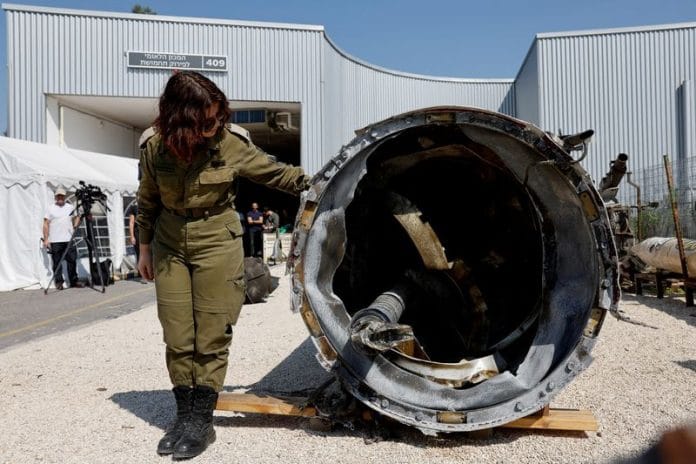By Scott Malone and James Mackenzie
WASHINGTON/JERUSALEM (Reuters) – The U.S. and its allies planned fresh sanctions against Iran over its unprecedented attack on Israel, seeking to dissuade Israel from a major escalation as its war cabinet was set to meet for a third time on Wednesday to decide a response.
While Saturday night’s attack caused no deaths and little damage thanks to the air defences and countermeasures of Israel and its allies, it has increased fears that violence rooted in the six-month-old Gaza war is spreading, with the risk of open war between long-time adversaries Iran and Israel.
Israel’s military chief of staff Herzi Halevi had promised Iran’s launch of more than 300 missiles, cruise missiles and drones at Israeli territory “will be met with a response”, but gave no details.
An Israeli government source said the war cabinet session scheduled for Tuesday had been put off until Wednesday, without elaborating.
Hoping to steer Israel away from massive retaliation, the U.S. and Europe flagged a toughening of economic and political sanctions against Iran.
The U.S. is planning to impose new sanctions targeting Iran’s missile and drone programme in the coming days and expects its allies will be following suit, National Security Advisor Jake Sullivan said in a statement on Tuesday.
Earlier, Treasury Secretary Janet Yellen said the U.S. would use sanctions, and work with allies, to keep disrupting Iran’s “malign and destabilising activity”.
She told a news conference in Washington all options to disrupt Iran’s “terrorist financing” were on the table, and she expected further sanctions against Iran to be announced soon.
European Union foreign policy chief Josep Borrell, speaking in Brussels after an emergency video conference of EU foreign ministers, said some member states had asked for sanctions against Iran to be expanded and that the bloc’s diplomatic service would begin working on the proposal.
Borrell said the proposal would expand a sanctions regime that seeks to curb the supply of Iranian drones to Russia so that it would also include the provision of missiles and could also cover deliveries to Iranian proxies in the Middle East.
Israeli Foreign Minister Israel Katz said he was “leading a diplomatic attack”, writing to 32 countries to ask them to place sanctions on Iran’s missile programme and follow Washington in proscribing its dominant military force, the Revolutionary Guard Corps, as a terrorist group.
‘CALM HEADS’
Iran launched the attack in retaliation for an airstrike on its embassy compound in Damascus on April 1 attributed to Israel, but has signalled that it now deems the matter closed.
President Joe Biden told Israeli Prime Minister Benjamin Netanyahu at the weekend that the United States, Israel’s main protector, would not participate in an Israeli counter-strike.
British Prime Minister Rishi Sunak told Netanyahu in a call on Tuesday that escalation in the Middle East was in nobody’s interest and would only worsen insecurity in the region, so it was “a moment for calm heads to prevail”, Sunak’s office said.
Japan Foreign Minister Yoko Kamikawa “strongly urged Israel to exercise restraint” during a call with her Israeli counterpart Israel Kantz on Tuesday evening, according to a readout of the call issued by Japan’s foreign ministry.
The prospect of Israeli retaliation has alarmed many Iranians already enduring economic pain and tighter social and political controls since major protests in 2022-23.
Since the war in Gaza began in October, clashes have erupted between Israel and Iran-aligned groups based in Lebanon, Syria, Yemen and Iraq.
Israel said four of its soldiers were wounded hundreds of metres inside Lebanese territory overnight, the first known Israeli ground penetration into Lebanon since the Gaza war erupted, although it has regularly traded fire with the heavily armed Lebanese Hezbollah militia.
In Gaza itself, where more than 33,000 Palestinians have been killed in the Israeli offensive according to Gaza health ministry figures, Iran’s action drew applause.
Israel began its campaign against Hamas, the Iranian-backed Palestinian militant group that runs Gaza, after the militants attacked Israel on Oct. 7, killing 1,200 people and taking 253 hostages, by Israeli tallies.
(Reporting by James MacKenzie and Maayan Lubell in Jerusalem, Parisa Hafezi in Dubai, Scott Malone, Jeff Mason and Daphne Psaledakis in Washington, Andrew Gray in Brussels, Suleiman al-Khalidi in Amman, Nidal al-Mughrabi and Adam Makary in Cairo, John Geddie in Tokyo; writing by Lincoln Feast; Editing by Miral Fahmy)
Disclaimer: This report is auto generated from the Reuters news service. ThePrint holds no responsibilty for its content.






